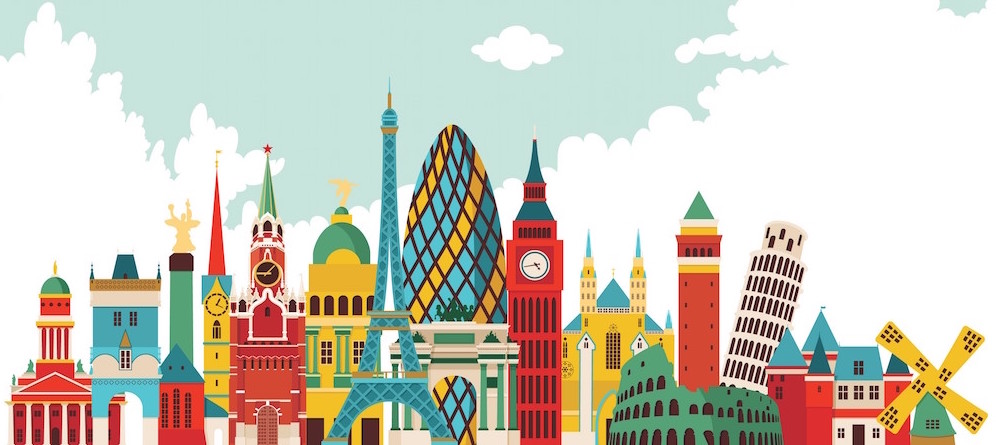By TERRY BOYD and CHERYL BOYD
We know through the magic of analytics that a lot of fellow Americans are country shopping in this apocalyptic period in our history. Our posts about “best countries for expats” and “Norway reaching out to Americans” have gotten hundreds of thousands of page views in the past few months.
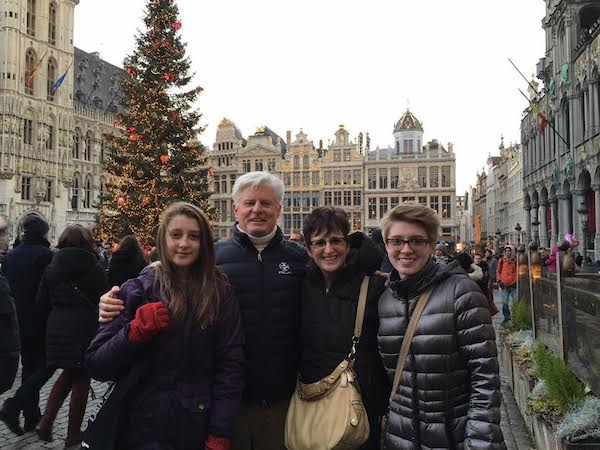
LIVING THE EXPAT LIFE IN BRUSSELS: FROM LEFT, LALE, TERRY, CHERYL AND LUCY
We suspect some significant percentage of Dispatches visitors are Americans writing “Escape this madhouse till it all blows over” on their list of New Year’s resolutions.
If that’s the case, this is for you ….
We have multiple personal friends looking at possibly moving to Europe including one who spent 10 months in Italy and the Netherlands during 2017, and who is planning a 2018 return.
Another is testing out life in Europe including Turkey for a year.
Why?
Without getting into the nastiness and divisiveness of the politics, let’s just say this isn’t a particularly happy time to be an American.
In 2018, patriotism will only take you so far. There is irrefutable empirical data that America is an increasingly tough place to live and raise a family.
A new survey finds that one out of 10 young adults between 18 and 25 has been homeless in the past year. The opioid epidemic is out of control to the point it’s cut life expectancy for two consecutive years. The middle class is shrinking. Mass shootings are routine. Even traffic deaths are up because there are no meaningful penalties for distracted drivers who are texting.
Because freedom!
Europe is no paradise. And we’re not trying to convince you to come here, just telling you there are options.
We know.
We sold (almost) everything and moved to the Netherlands in 2016. After 18 months, we feel vindicated. Beyond politics, we can tell you from years of living in Europe that there are many, many reasons you might want to think about dipping a toe into European life, at least for a while.
And when we say “Europe,” we mean basically Western Europe, the Nordics, the Baltics and some of the former Eastern Bloc countries such as Bulgaria and Romania.
Would we recommend moving to Albania? No.
There are still countries such as Kosovo, Albania, Belarus and Moldova that are not really ready for expat Prime Time, lacking opportunities and rule of law. We’d also have – how do we put this? – reservations about Poland and Hungary as they shift hard right under authoritarian nationalist governments.
Otherwise, these are the areas – drawn from our personal experiences – where life in Europe is great in no particular order of importance:

Quality of life instead of a rat race
The life we left behind in the U.S. was frenetic, sometimes fun, but always exhausting. Yes, we worked four years getting a startup digital media company off the ground, so our lives were particularly stressful. But Americans largely – as they say in the Army – embrace the suck. That is, they take a perverse pride in working around the clock, skipping vacations and taking work home.
That ain’t how we roll here.
Whether in France, Italy, Germany, the Netherlands or Scandinavia, people take time to actually enjoy life. Honestly, I don’t know how TV stations stay in business here because wherever you go – from Barcelona to Vienna – Europeans are in the coffee shops, weinstubes, cafes, pilsstubes and restaurants. Everyone we know here, including entrepreneurs, work to live … to have the disposable income to take multiple trips during the year. The Dutch, in particular, are big on finding new and ever more exotic destinations.
Finally – and this is anecdotal – age discrimination feels less insidious here. By and large, European countries have far more multi-generational participation whether you’re talking about the workplace or social milieus. We’ve seen this living in the Netherlands, Germany and especially Turkey.
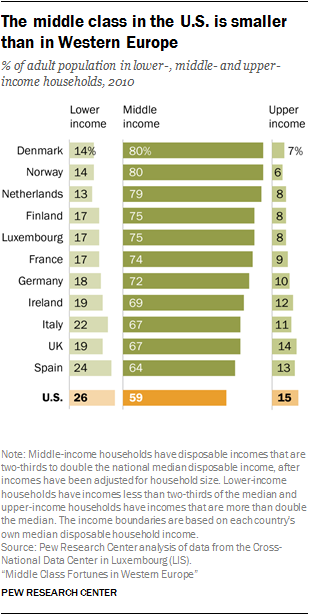 The American Dream is alive and well in Denmark:
The American Dream is alive and well in Denmark:
Since the 1970s, the storied American Middle Class has shrunk from roughly 80 percent of the population to about 50 percent as the economy transitioned from lots of well-paying jobs in heavy industry to a fortunate few making millions in the financial and tech sectors.
As a result, no other nation in the 35-member Organization for Economic Cooperation and Development has such unequal wealth distribution as the U.S., and none has experienced such a sharp rise in inequality, according to a recent New York Times post, “Myths of the 1 Percent; What Puts People at the Top.”
In most of western Europe, the middle class is still huge, especially Denmark and the Netherlands. Check out this chart.
Public transportation is there for you:
In the U.S., the only time we used MassTran was when we were in Washington, D.C. or Chicago. Here, we use it constantly whether we’re in Amsterdam, Berlin, Stockholm, Vienna or Paris.
It still amazes and delights us every time we get on a train and go across the Netherlands in an hour for a meeting, then step off the train in the evening back in our HQ city of Eindhoven still fresh and ready to go back to work. (Yes, we’re Americans.)
Travel ops like no place on Earth:
Europe is fun and fabulous for travelers. So is the United States. We still miss the Wild West, thoroughbred racing at Keeneland in Lexington, Ky., shopping in Chicago and the national treasures of Washington D.C.
But Europe has more bucket-list destinations than any other continent. This is subjective, of course, but it’s all here, from the most glamorous cities to the highest mountains to the most spectacular vineyards to endless beaches. And all of it is a quick flight or a relaxing train ride away.
Speaking of quick flights, low-cost airlines rule here as opposed to United and Delta in the U.S. As a function of that, there are multiple great regional airports here so there are alternatives to Frankfurt, Heathrow and Charles de Gaulle.
Even our little Eindhoven Airport flies to more than 75 destinations.
From our anecdotal accounts, travel is a huge factor in expats’ decisions to make the move to Europe.
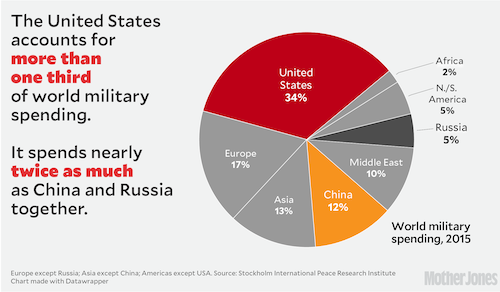 Societal cohesion is the norm:
Societal cohesion is the norm:
In the U.S., while we love the unborn, we’re not that keen on kids and moms. Things like paid maternity leave are considered the worst sort of socialist, secular liberal Muslim communism.
In Europe, moms get paid leave and lots of it. In countries such as Finland, dads do too.
Health care is excellent. You won’t starve if you lose your job. Most people get some sort of housing assistance because housing is really expensive in every major European city.
Yes, taxes are (slightly) higher than in the U.S. to pay for all of this. But what few Americans realize is, they subsidize European security so the Europeans can dedicate tax revenue to making citizens’ lives better. Military spending eats up about half of the U.S. discretionary budget – which pays for U.S. bases across Europe from the Azores to Hungary.
Education in Europe, unlike in the U.S., is encouraged and people with graduate degrees held in high esteem.
In the American “cowboy” mindset of rugged individualism, a social safety net and social services are just so wrong. But they sure make for a less stressful life. There’s a general feeling of cohesion – of working for the greater good as opposed to the current American trend of making laws that only benefit the One Percent.
Public safety over law-and-order:
 This could be under “quality of life.” But the situation here is so completely the reverse of the U.S. that it gets its own category. Everyone knows Europe has tough gun laws and rates of gun violence are a fraction of those in the U.S.
This could be under “quality of life.” But the situation here is so completely the reverse of the U.S. that it gets its own category. Everyone knows Europe has tough gun laws and rates of gun violence are a fraction of those in the U.S.
For all of 2017, my hometown of Louisville, Ky., population 1.3 million, had roughly the same number of gun homicides – about 100 – as the entire country of the Netherlands, population 17 million. The U.S. averaged 2.7 gun homicides for every 100,000 people between 2010 and 2015.That’s 10 times the rate in the Netherlands and France, with 0.2 per 100,000 people. Germany and Spain have even lower rates!
What a lot of Americans don’t know is that police here aren’t trained to shoot first and ask questions later. There are European countries where police don’t even carry weapons including Iceland, the Republic of Ireland and Norway.
In most of Europe, police are trained to interact with the public, recruited from all walks of life and ethnic groups. In the U.S., police are recruited from the military, where “violence of action” is the foundation of training. So American police are primed for violent confrontation. Then, they actively patrol, which means they stop people for routine traffic violations, and that’s when a lot of shootings occur. Especially if you’re caught driving while black.
In Europe, policing typically is passive. If you’re caught speeding in Germany or the Netherlands, it’s by a camera. A ticket comes in the mail with a photo of your car and all the data on speed and location. You might end up a few euros poorer, but you won’t be dead.
Freedom of – and from – religion:
In the States, the Religious Right is a distinct minority, yet a potent political force with the power to shape state laws to impose their values: Guns, Jesus and opposition to abortion and birth control.
While there’s really no equivalent movement here, religious conservatives do hold sway in countries such as Poland and Hungary.
But overall, religion is just background noise in Europe. Austrian courts just legalized gay rights, and there is a growing movement to abolish the Republic of Ireland’s restrictive abortion laws. In Italy, the Roman Catholic Church still has serious political sway, though church attendance is waning.
Global mobility of talent means big opportunities:
What’s that? You’ve been working at Starbucks for like five years to pay off that MBA? Maybe you should think about Europe.
We’re profiling more American expats including people like George Gottl in Amsterdam and Keith Gibson in Italy who are finding personal and professional success in Europe.
Life is always about the math, and the numbers aren’t in Europe’s favor. Which is good for expats. Most European countries have rapidly aging demographics, with more people retiring than entering the workforce. Just in the Netherlands, there are projected to be only 1.2 million people to fill 1.6 million job openings by 2020.
More and more European countries such as France are offering new startup and entrepreneur visas while liberalizing business regulations.
At the same time, American-based multinationals such as Amazon, Salesforce and Netflix are increasing their presence in Europe.
Watch our jobs postings on Passports for something right for you. Also, we just added a new content category – careers – with news about jobs in Europe. And don’t forget we have posts explaining what you have to do to work in Europe as a non-EU citizen.
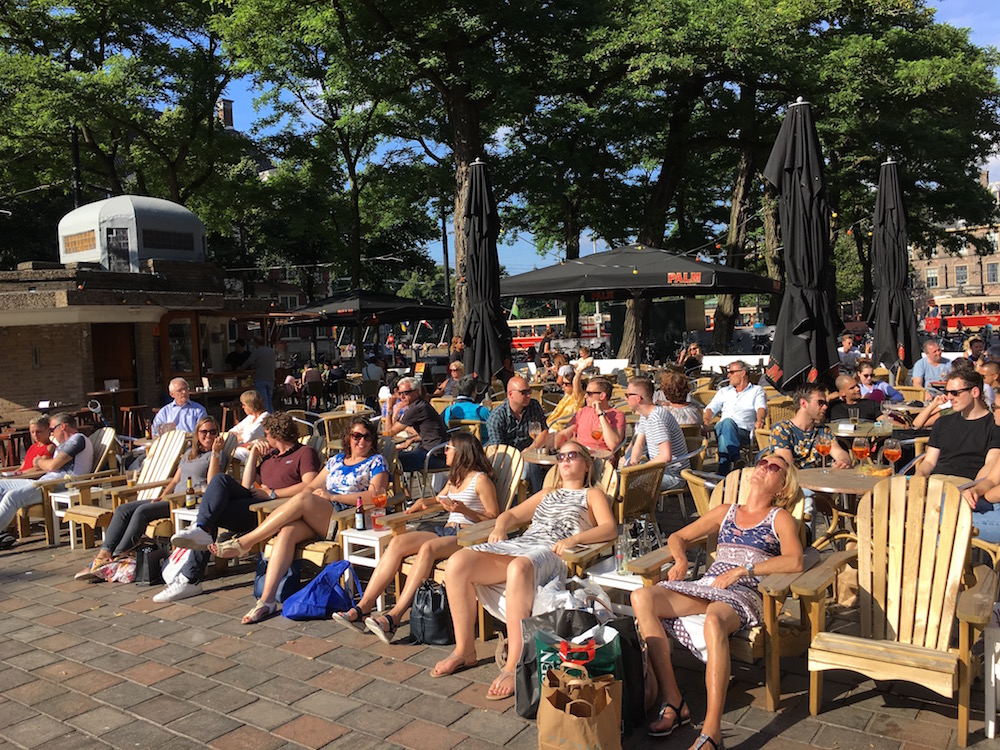
CATCHING RAYS IN DEN HAAG
The weather is not as bad as you’ve heard:
This is a little tongue-in-cheek because all of Europe is above 36 degrees north latitude, which means we get long, cool winters and too-brief summers compared to, say, Southern California.
In fact, the joke where we live in the Netherlands is that it’s a great place to have a startup because it rains all the time and there’s nothing else to do. In fact, we found out pretty quickly that’s not quite accurate. The weather here is a lot like San Francisco, Seattle or Portland, Oregon … 50-degrees and cloudy much of the year.
One big difference in living in Europe is there are no tornadoes or hurricanes, and ice and hail storms are rare. We’d like to know how many weeks we spent in our hometown of Louisville, Ky. waiting for the power to come back on after storms because A.) severe storms are a regular feature of life in the South and 2.) the infrastructure sucks.
No Trump
I mean come on … we had to say it.


